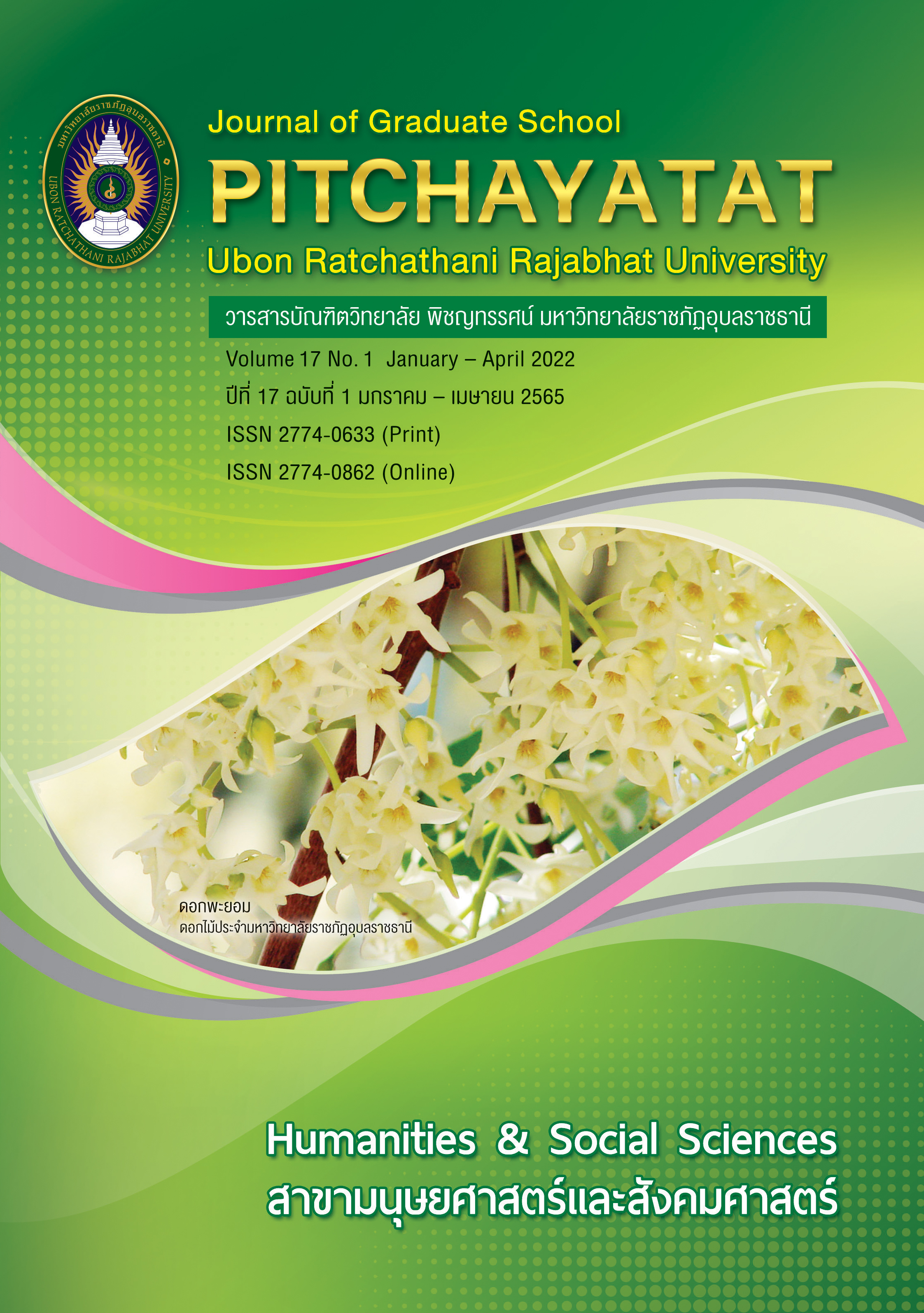สภาพ ความต้องการจำเป็น และแนวทางพัฒนาการจัดการเรียนรู้ออนไลน์ของผู้สอน ในสถานศึกษาสังกัดสำนักงานเขตพื้นที่การศึกษามัธยมศึกษานครพนม
คำสำคัญ:
สภาพการจัดการเรียนรู้ออนไลน์ , ความต้องการจำเป็น , แนวทางพัฒนาการจัดการเรียนรู้ออนไลน์บทคัดย่อ
การวิจัยนี้มีวัตถุประสงค์เพื่อ 1) ศึกษาสภาพปัจจุบันและสภาพที่พึงประสงค์ 2) ประเมินความต้องการจำเป็น 3) พัฒนาแนวทางพัฒนาการจัดการเรียนรู้ออนไลน์ของผู้สอนในสถานศึกษาสังกัดสำนักงานเขตพื้นที่การศึกษามัธยมศึกษานครพนม ตัวอย่าง ได้แก่ ผู้บริหารสถานศึกษา จำนวน 69 คน และผู้สอน จำนวน 250 คน กำหนดขนาดตัวอย่างโดยใช้เกณฑ์ร้อยละของบุญชม ศรีสะอาด ได้มาโดยการสุ่มแบบแบ่งชั้น เครื่องมือที่ใช้ในการวิจัย ได้แก่ 1) แบบสอบถามสภาพปัจจุบันของการจัดการเรียนรู้ออนไลน์ของผู้สอน มีค่าอำนาจจำแนกรายข้อระหว่าง .27 - .76 และมีค่าความเชื่อมั่นทั้งฉบับเท่ากับ .92 2) แบบสอบถามสภาพที่พึงประสงค์ของการจัดการเรียนรู้ออนไลน์ของผู้สอน มีค่าอำนาจจำแนกรายข้อระหว่าง .33-.82 และมีค่าความเชื่อมั่นทั้งฉบับเท่ากับ .95 3) แบบสัมภาษณ์แบบมีโครงสร้างและ 4) แบบประเมินความเหมาะสมและความเป็นไปได้ของแนวทางพัฒนาของการจัดการเรียนรู้ออนไลน์ของผู้สอน เครื่องมือที่ใช้ในการวิจัยทั้ง 4 ฉบับ มีค่าดัชนีความสอดคล้องเท่ากับ 1.00 ทุกข้อ ทุกฉบับ สถิติที่ใช้ได้แก่ ร้อยละ ค่าเฉลี่ย ส่วนเบี่ยงเบนมาตรฐานและค่าดัชนีการจัดลำดับความสำคัญของความต้องการจำเป็นแบบปรับปรุง (PNI Modified)
ผลการวิจัยพบว่า
- สภาพปัจจุบันของการจัดการเรียนรู้ออนไลน์ของผู้สอน โดยรวมอยู่ในระดับมาก สภาพที่พึงประสงค์ของการจัดการเรียนรู้ออนไลน์ของผู้สอนโดยรวมอยู่ในระดับมากที่สุด
- ผลการประเมินความต้องการจำเป็นของการจัดการเรียนรู้ออนไลน์ของผู้สอน ที่มีค่าเฉลี่ยสูงสุด 3 อันดับแรก ได้แก่ ด้านผู้สอน ด้านการวัดและประเมินผล และด้านสื่อเทคโนโลยีการเรียนรู้
- แนวทางการพัฒนาการจัดการเรียนรู้ออนไลน์ของผู้สอน มีผลการประเมินแนวทางพัฒนาโดยรวมพบว่า มีความเหมาะสมอยู่ในระดับมากที่สุด และมีความเป็นไปได้ อยู่ในระดับมากที่สุด
เอกสารอ้างอิง
กาญจนา บุญภักดิ์. “การจัดการเรียนรู้ยุค New Normal,” ครุศาสตร์อุตสาหกรรม. 19, 2 (พฤษภาคม-สิงหาคม 2564): 1-6.
คณะกรรมการการศึกษาขั้นพื้นฐาน, สำนักงาน. เลขาฐิการ กพฐ. และผู้บริหาร สพฐ. ร่วมประชุมคณะกรรมการการศึกษาขั้นพื้นฐาน ครั้งที่ 5/2564. กรุงเทพฯ: สำนักงานคณะกรรมการการศึกษาขั้นพื้นฐาน, 2564.
จักรกฤษณ์ โพดาพล. การจัดการเรียนรู้ออนไลน์: วิถีที่เป็นไปทางการศึกษา Online Learning Management : New Normal of Education. เลย: มหาวิทยาลัยมหามกุฏราชวิทยาลัย วิทยาเขตศรีล้านช้าง, 2563.
เฉลิมชัย เลี้ยงสกุล. การศึกษาในยุค COVID-19. บทความวิชาการ วิทยาลัยเสนาธิการทหาร. หลักสูตรเสนาธิการทหาร รุ่นที่ 11, 2563. หน้า 1-8.
ฐาปนีย์ ธรรมเมธา. จากทฤษฎีสู่การปฏิบัติ e-Learning: from theory to practice โครงการตำราอีเลิร์นนิง: โครงการมหาวิทยาลัยไซเบอร์ไทย สำนักงานคณะกรรมการการอุดมศึกษา. กรุงเทพฯ: สหมิตรพริ้งติ้งแอนด์พับลิสชิ่ง, 2557.
ณฐภัทร ติณเวส และฐาปณีย์ ธรรมเมธา. “การศึกษารูปแบบการจัดการศึกษาออนไลน์ระบบเปิดแบบ MOOC ของ อุดมศึกษาไทย,” Veridian E-Journal. 9, 3 (กันยายน-ธันวาคม 2559): 1463 - 1479.
บุญชม ศรีสะอาด. การวิจัยเบื้องต้น. พิมพ์ครั้งที่ 10. กรุงเทพ ฯ: สุวีริยาสาส์น, 2560.
ปรัชญนันท์ นิลสุข. “พลิกโฉมอุดมศึกษาไทย: วิถีใหม่ของการเรียนการสอนการจัดการเรียนการสอนออนไลน์ ที่มีคุณภาพ. โครงการประชุมวิชาการ ครั้งที่ 16 ปีการศึกษา 2564 สำนักงานปลัดกระทรวงอุดมศึกษาวิทยาศาสตร์ วิจัย และนวัตกรรมร่วมกับสมาคมเครือข่ายพัฒนาวิชาชีพอาจารย์และองค์กรระดับอุดมศึกษาแห่งประเทศไทย. กรุงเทพฯ: มหาวิทยาลัยศรีนครินทรวิโรฒ, 2564. หน้า 48.
ปราวีณยา สุวรรณณัฐโชติ. การประยุกต์ใช้เครื่องมือออนไลน์เพื่อจัดการเรียนออนไลน์แบบต่างเวลากัน (Asynchronous Learning) และเทคนิคการประเมินผลงาน. กรุงเทพฯ: ภาควิชาเทคโนโลยีและสื่อสารการศึกษา คณะครุศาสตร์ จุฬาลงกรณ์มหาวิทยาลัย, 2563.
มหาวิทยาลัยสวนดุสิต. คู่มือการจัดการเรียนการสอนออนไลน์มหาวิทยาลัยสวนดุสิตสำหรับนักศึกษา. กรุงเทพฯ: ศูนย์บริการสื่อและสิ่งพิมพ์กราฟฟิคไซท์ มหาวิทยาลัยสวนดุสิต, 2563.
วิชัย วงษ์ใหญ่ และมารุต พัฒผล. จากการเรียนรู้ออนไลน์สู่การสร้างสรรค์นวัตกรรม: ศูนย์ผู้นำนวัตกรรมหลักสูตรและการเรียนรู้. กรุงเทพฯ: มหาวิทยาลัยศรีนครินทรวิโรฒ, 2563.
สมาคมพยาบาลด้านการป้องกันและควบคุมโรคติดเชื้อ. คู่มือวัคซีนสู้โควิดฉบับประชาชน. เชียงใหม่: มหาวิทยาลัยเชียงใหม่, 2564.
สุวิมล ว่องวาณิช. การวิจัยประเมินความต้องการจําเป็น. พิมพ์ครั้งที่ 4. กรุงเทพฯ: จุฬาลงกรณ์มหาวิทยาลัย, 2562.
Albrahim, Fatimah A. “Online Teaching Skills and Competencies : Ministry of Education,
Saudi Arabia,” The Turkish Online Journal of Educational Technology. 19, 1 (January 2020): 1-12.
Moore, Michael Grahame . “The Handbook of Distance Education,” The American Journal of Distance Education. 17, 2 (2003): 73-75.
Raman, R. el al. “Adoption of online proctored examinations by university students during COVID-19 : Innovation diffusion study,” Education and Information Technologies, 6 (2021): 1-20.
ดาวน์โหลด
เผยแพร่แล้ว
รูปแบบการอ้างอิง
ฉบับ
ประเภทบทความ
สัญญาอนุญาต
ลิขสิทธิ์ (c) 2022 วารสารบัณฑิตวิทยาลัย พิชญทรรศน์ มหาวิทยาลัยราชภัฏอุบลราชธานี

อนุญาตภายใต้เงื่อนไข Creative Commons Attribution-NonCommercial-NoDerivatives 4.0 International License.
บทความทุกเรื่องได้รับการตรวจความถูกต้องทางวิชาการโดยผู้ทรงคุณวุฒิภายนอกอย่างน้อย 3 คน ความคิดเห็นในวารสารพิชญทรรศน์เป็นความคิดเห็นของผู้นิพนธ์มิใช่ความคิดเห็นของผู้จัดทำ จึงมิใช่ความรับผิดชอบของวารสารพิชญทรรศน์ และบทความในวารสารพิชญทรรศน์สงวนสิทธิ์ตามกฎหมายไทย การจะนำไปเผยแพร่ต้องได้รับอนุญาตเป็นลายลักษณ์อักษรจากกองบรรณาธิการ





